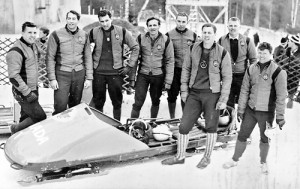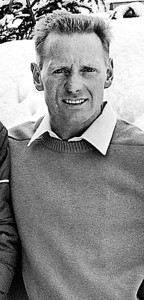The day we won Winter Gold
The day when a sportsman stops thinking above all else of the happiness in his own effort and the intoxication of the power and physical balance he derives from it, the day when he lets consideration of vanity or interest take over, on this day his ideal will die
- Baron Pierre de Coubertin, founder of the modern Olympic Games

The l964 Winter Olympics Canadian Bobsled team, left to right: Gordon Currie, John Emery, Christopher Ondaatje, Lamont Gordon, David Hobart, Vic Emery, Peter Kirby and Douglas Anakin
The 2014 Winter Olympic Games now being held in the Russian resort of Sochi, is likely to be a dramatic affair, featuring professional athletes at the very top of their game.
But before 1972 the one firm rule that governed the Olympic Games was that only amateur athletes were allowed to compete. Half a century on, it is almost impossible to imagine what we went through just to compete in the bobsled in the 1964 Olympics.
The team had virtually no funding and had to train in distant Europe, but to everyone’s astonishment the almost unknown Canadian team won the gold medal for four-man bobsledding at Innsbruck, beating the favoured Italian and Austrian teams. I was lucky to be part of it and pride surged through my veins when the Canadian team walked into the Olympic Arena.
Although tobogganing started in 1880 in Canada, Canadians didn’t get really involved for another 50 years when Lamont Gordon and Vic Emery heard about another Canadian, Doug Connor, who had broken the track record on the famous Cresta Run in St. Moritz. No sooner had they graduated from university than they worked as deckhands across the Atlantic and headed for St. Moritz where they met other devotees who had both the money and the lust for danger.
When money ran out they returned to Canada and scraped together a team to compete in the 1961 World Championship in Lake Placid, New York. I was one of the early team members and we formed the Canadian Bobsled Club that sold “associate” memberships and somehow raised $5,400, which we sent as a deposit to Dondria Podar, who manufactured racing sleds in his tiny shed in Cortina, Italy.
The sleds arrived in time for Gordon, Emery and six others, including me, to train and then compete on the longer, narrower and sometimes more treacherous Lake Placid Run with its notorious Zig-Zag traversing corner. We were badly beaten but got our first taste of international competition.
Canada sent a team to both the 1962 World Championships at Garmisch- Partenkirchen – the scene of the 1936 Winter Olympic Games, and then the 1963 Championships in Igls near Innsbruck, the same run scheduled for the Olympic Games.
It was a rough year for Canada and a dangerous accident caused Gordon’s sled to capsize, cutting his throat badly under his chin. He was carried unconscious to hospital in Innsbruck, where he spent several days recovering. He still has the brutal scar. Again in 1963

Great sportsman: Eugenio Monti. Pic courtesy Getty images
the favoured Italians won both the two-man and four-man events and the Canadian team was little improved. The experience, however, was invaluable.
Then, almost exactly 50 years ago, it was the 1964 Olympic Games and our first official international recognition. We were allowed a coach – Doug Connor (who had inspired Gordon and Emery in the 1950s) and a manager, Charles ‘Chuck’ Rothgeb. We went to Cortina first to practisce and realised that well-coordinated starts might provide the edge between winning and losing. We worked harder on this than the others and it might have made a difference. One could tell almost from the beginning that the Canadian team had a chance – not only because of improved driving, but also because we acted and looked like a well-rehearsed team.
The two-man bobsled event started on February 2 and whereas Vic Emery’s team did surprisingly well, coming in fourth, it was the British team of Tony Nash and Robin Dixon who beat the Italian favourites and won the gold medal.
Then the weather turned warm and we were only allowed one day for practice, during which Vic Emery, driving his Canada I sled, produced the fastest time of the day. Gordon, driving the Canada II sled, which I was on, continued to have trouble on the top half of the run. After all our practice on the starts we were a bit disappointed.
The following day was a great day for Canada. Vic Emery with runs of 1:02:99 (a track record) and 1:03:82 was in first place. The two Italian sleds – one of them captained by Eugenio Monti – were lying in second and third place. Gordon, with times of 1:04:63 and 1:04:43, his best times to date, was in 11th position.
Then the organising committee surprisingly decided to split the remaining two runs, normally run on the same day, to February 6 and 7. Nevertheless, Vic Emery on Canada I had a good third run, the second fastest of the day, and increased his lead on everyone except the Austrians – now in second place. Our sled, Canada II, gained a single place to tenth.
Then the final day and the final runs. Both Canadian sleds were in the second half of the starters, with Canada I running third from the end. The track was becoming rough and rutted, so our back positions didn’t help. The second Italian team managed a fast time and Canada I was next. Above the roars of the crowd we could only just hear the times. They were good. Then, towards the end, Emery made a mistake and slowed to the second fastest time of the day. Two more sleds to come.
One was Eugenio Monti, who could work miracles with a bobsled. Austria I had the best starting time, but only finished one tenth of a second of Emery’s time. Then it was Monti’s turn. By the time he was halfway down we knew he could not do it and that Canada had won. Emery stepped up to slap Monti on the back and then pandemonium. The Canada I team of Vic Emery, Doug Anakin, John Emery and Peter Kirby were hoisted on to the shoulders of the British team and cheers rang out. Frantic television cameras tried to get a good picture of the celebrations in vain.
It was an extraordinary ending to the Olympic Games. Great Britain had unexpectedly won the two-man event; and Vic Emery and his Canada I sled had won Canada’s only gold medal at the 1964 Olympic Games. We were in a state of euphoria. Nothing on earth could ever match it.
But there is another story behind this one. Eugenio Monti, the Italian bobsledder, is now regarded as one of the most successful athletes in the history of the sport, with 10 world championships, nine of them gold, and six Olympic medals.
But he will also be remembered for two acts of sportsmanship during the 1964 Winter Olympic Games in Innsbruck. Realising that the British bobsledders Tony Nash and Robin Dixon had broken a bolt on their sled before their final run, Monti lent them the bolt off his own sled. The Britons won the gold medal and Monti and his teammate took the Bronze. But that was not his only act of selfless generosity. In the four-man competition Vic Emery’s Canadian team damaged their sled’s rear axle and would have been disqualified had not Monti and his mechanics come to the rescue. The sled was repaired and the Canadian team went on to win the gold medal. For this, Monti was awarded the Pierre de Coubertin medal.
It is almost impossible to believe that this could ever happen in the cut-throat professionalism of today’s Olympics. But there was a time when sportsmanship really was everything.


